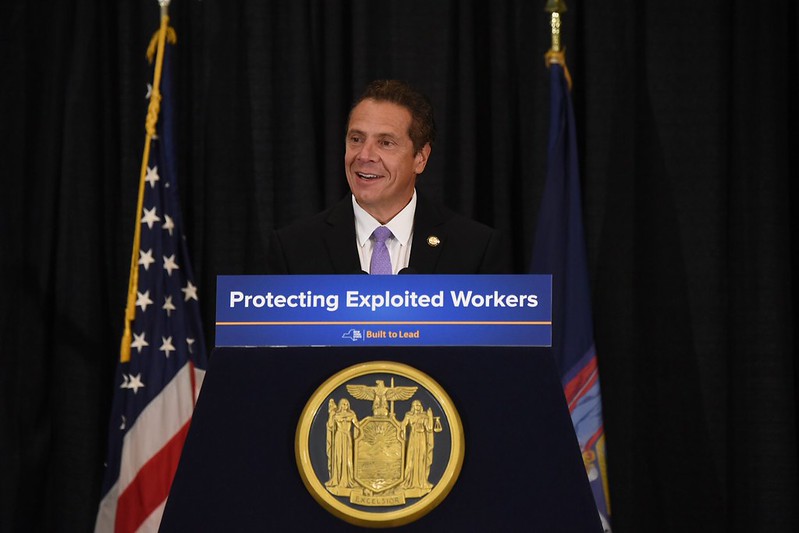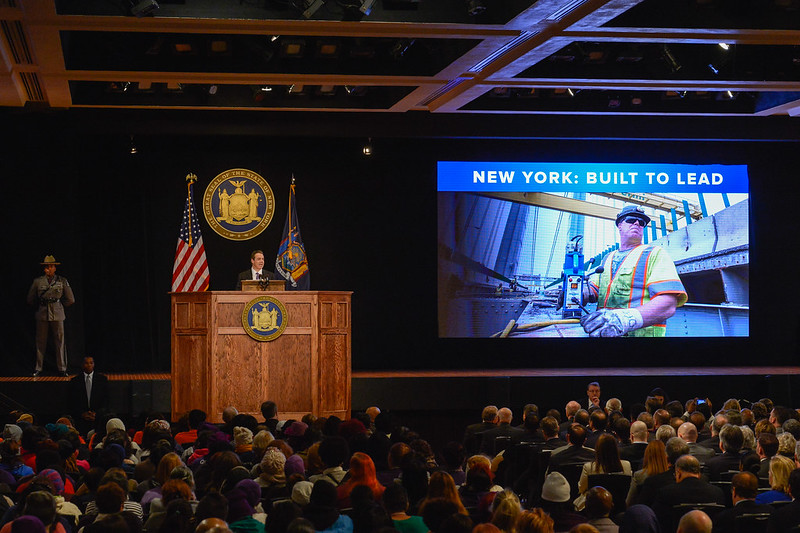Why the Charter School Proposals by Bernie Sanders and Elizabeth Warren Shouldn’t Be Controversial

(photo: Michael Appleton/Mayor's Office)
Recently, a group of charter school supporters received media attention by protesting at an Elizabeth Warren campaign event, claiming she wants to shut down all charter schools. This is categorically untrue. No one, not Elizabeth Warren, not Bernie Sanders, not even public school advocates like ourselves, is pushing to unilaterally shut down existing non-profit charter schools.
Rather, both Warren and Bernie Sanders have released plans that demand a bare minimum of accountability from existing charter schools -- including financial and operational transparency and requirements that they serve all students. Both presidential candidates also propose ending the federal grant program for new charter schools, imposing a moratorium on charter expansion, and banning for-profit charter schools.
As a former charter school parent and a former charter school teacher, we support these proposals – and we believe, that if implemented both at the federal level and with a similar approach at the state level, this agenda would actually improve charter schools while also limiting some of the harm they have done to district public schools.
First, a little about our experiences, which are, sadly, far from unique.
I, Liat, spent my first year teaching at a Brooklyn charter school that was started by non-educators and suffered from extreme turnover in administrators and staff. We had six principals over the course of the first year, and ten teachers either quit or were fired. We also lost special education students because our school wouldn’t or couldn’t provide the services they needed. Instead, they were sent to nearby public schools. Now that I work in a public school in District 14, we experience the reverse process -- my school has no choice but to accept the many students pushed out by charter schools when they don’t conform to their rigid academic or behavioral expectations.
I, Fatima, am a single mother whose son was suspended over 30 times by his charter school, Upper West Success Academy, starting in first grade, including for very minor issues, such as walking up the stairs too slowly. He was also denied his mandated special education services, which worsened the situation. The school demanded that I pick him up so frequently in the middle of the day that I was forced to drop out of college myself. When I finally pulled him out of the school, his therapist told me he suffered from symptoms of post-traumatic stress.
Then when my son and I were subsequently interviewed on the PBS Newshour about how he had been treated at the school, Success Academy officials at the network sent copies of his disciplinary files, full of trumped-up charges, to every education reporter they could find and posted it online. Eva Moskowitz, the Success Academy CEO, also recounted false stories about his behavior in her published memoirs.
Although the US Department of Education eventually found her and the school guilty of violating the federal student privacy law called FERPA more than three years after I filed my initial complaint, Success officials have refused to comply with the law and continue to retaliate in the same way against other parents who dare to speak out against the unfair treatment of their children by releasing their confidential files to reporters. Meanwhile, the New York State Education Department has confirmed that Success Academy has systematically failed to provide students with their mandated special education services, even after having been ordered to do so by hearing officers.
Since my son left Success Academy, he is slowly recovering, and is now doing better in high school, but it took him years to undo the damage he experienced. I have met many other parents whose children suffered similar or worse fates. Success Academy charters are currently facing five different federal education lawsuits for violating student rights, and yet are the fastest growing charter chain in the state of New York, having received more than $60 million in grants from the federal government since 2006 to aid in their expansion and replication.
Now let’s look at the Warren and Sanders proposals, which call for more accountability and oversight for the charter sector.
Both senators say if elected president, they would end the federal grant program known as the Charter School Program (CSP) that funds new charter schools. Aside from funding the expansion of chains like Success, a recent report revealed that this grant program has awarded more than $1 billion in start-up funds to charters that failed to open or quickly closed. At the same time, both candidates support increasing federal Title I funding, which would financially benefit most charter schools as well as district public schools that serve a high-poverty student population.
Warren would quadruple Title One funding, increase IDEA funding for students with special needs, and press states to boost their own education funding and make it more progressive. Sanders would triple Title I funds, increase IDEA funding, and provide schools with more funding to reduce class sizes. Charter schools would be eligible to receive all of this funding as well as public schools.
At the same time, both candidates also call for stronger charter oversight, and would ban for-profit charter schools and those that outsource operations to for-profit managers, which have been found to be particularly prone to fraud. And both call for a moratorium on charter school growth, following the lead of the NAACP and Black Lives Matter, which have made this a central point in their advocacy, because charter schools have worsened school segregation and the school to prison pipeline through "no excuses" disciplinary practices that lead to excessive suspensions and expulsions.
The NAACP has also expressed concern about how, increasingly, public funds are “diverted to charter schools at the expense of the public school system,” even as many public schools already lack the resources they need to provide a well-rounded education.
Here in New York City, charter schools siphon more than $2.1 billion per year from the Department of Education’s budget, and take up an increasing amount of space in public school buildings, where more than half-a-million students suffer in overcrowded buildings. If the city refuses to offer space to new charters in public schools, they must help pay for their rent in private spaces, which is costing taxpayers an additional $100 million a year. A recent report from Class Size Matters found that the DOE has been paying millions of dollars each year to charter schools to rent space in buildings owned by their charter management company or an affiliated LLC or foundation.
In 2013, the credit rating agency Moody’s warned investors that the rise in charter school enrollments would likely cause negative pressure on public school budgets. Several studies since have confirmed that charter expansion has caused serious harm to district finances in Pennsylvania, North Carolina, and California, putting at risk these essential democratic institutions.
We support parent “choice” as long as this doesn’t undermine the ability of children, wherever they attend school, to receive a quality education in safe and caring learning environments. But many charter school advocates do not seem interested in basic accountability and transparency measures that would benefit students enrolled in both charter and DOE public schools. Rather, “choice” has become a euphemism for another aim -- not to improve or defend existing charter schools -- but to dismantle and eliminate as many traditional public schools as possible. This is the end-game of many of the charter movement’s billionaire backers, like the Walton family, the Koch brothers, and Betsy DeVos.
By articulating a need for minimal accountability so that charter schools operate equitably and humanely, and by ending special federal funding streams that encourage unchecked charter growth, Elizabeth Warren and Bernie Sanders are simply trying to ensure that all students are able to attend schools that will help them thrive academically, socially, and emotionally. There should be no controversy about these essential goals.
***
Liat Olenick is a public school teacher in Brooklyn. Fatima Geidi is a parent.
***
Have an op-ed idea or submission for Gotham Gazette? Email This email address is being protected from spambots. You need JavaScript enabled to view it.
As Albany Considers Regulations, Gig Economy Workers Must Be Heard

(photo: Don Pollard/Governor's Office)
I recently attended a fascinating panel on a topic that will be hotly-debated in Albany in 2020 – the regulation of the gig economy workforce. I listened to representatives from organized labor. We heard from spokespeople from technology platforms like Postmates and DoorDash. There were academics. There were even public officials, such as State Senator Diane Savino, the sponsor of a bill that could radically shift the nature of work for hundreds of thousands in New York State.
Know who was missing from the panel? Gig economy workers themselves. And their voices must be heard.
We already know where the labor unions stand. They are pushing hard to get Uber drivers, Door Dashers, and Task Rabbits reclassified from independent contractors (who have no right to unionize) to traditional employees (who do). With union membership eroding the last 50 years, organized labor needs to regain relevance, and getting jurisdiction over the fast-growing gig workforce is a ripe chance for it to do so. The unions have strong relationships, built over decades, with lawmakers in Albany. And, with the recent backlash against big tech, the timing is right for them to act.
We also know what the technology companies want: the status quo. They have built their companies, and fortunes, on the premise that their drivers, dashers, and dog walkers are independent contractors who log on when they want and earn what they can. Some tech platforms are now discussing offering limited benefits, such as retirement and health plans, for their freelancers. But the potential full reclassification of their workforces represents an existential threat to these companies.
The tech companies are scared. And, while they don’t have many friends in Albany, they have piles of money to hire lobbyists and advisors to gear up for this fight. In California, where a law was recently passed attempting to clarify the issue, the tech platforms have pledged $90 million to support a ballot initiative that would exempt their workers from the legislation.
What we still don’t know, in California, New York, or anywhere else, is what the workers themselves want. Do most prefer the autonomy, if unpredictability, that comes with being your own boss? Or would the majority of them rather a more conventional but stable work arrangement?
So far, these workers have been getting lost in the shuffle. Last year, in an effort to protect drivers from falling earnings, the New York City Council passed a law requiring the ride-sharing apps to pay $17.22 per hour minimum wage. The unions declared a victory. But the drivers ended up getting shafted, when (predictably enough) Uber and Lyft began limiting drivers’ hours in response, leaving them worse off. Unable to stay profitable under these new rules, Juno – founded, ironically enough, as a driver-friendly alternative to Uber and Lyft – went bankrupt last month.
For sure, gig economy workers are not monolithic. The freelance graphic artist in DUMBO might not want the same working arrangement as the single mom cleaning houses in Crown Heights. Some people crave a 9-to-5, while others seek nontraditional hustles. One thing is for sure: we should not assume what any of them want. And we should not trust the unions or tech companies to speak honestly for these workers when their own hides are so much at stake.
Won’t the legislative process adequately hear these workers’ voices? That’s wishful thinking. We can’t expect the average Lyft driver to call his state senator or show up to testify at a public hearing in Albany, if he even knows it’s taking place.
Instead, neutral researchers should be tasked to survey gig economy workers across the state. Journalists must go interview these workers in the streets – not just the hand-picked few put forward by the unions and tech companies at their press conferences. And state legislators must devise ways to hear from all their constituents, not just those who know their way around the State Capitol.
This is a high-stakes game of chess between two powerful factions, labor unions and technology companies. Gig economy workers must not be the pawns.
***
Sean Basinski founded the Street Vendor Project at the Urban Justice Center and was, until 2019, its director. On Twitter @SeanBasinski.
***
Have an op-ed idea or submission for Gotham Gazette? Email This email address is being protected from spambots. You need JavaScript enabled to view it.
Even Amid Impeachment Chaos, New Yorkers Must Keep Their Eyes on Albany

(photo: the Governor's Office)
With the eyes of the world focused on the impeachment frenzy currently consuming Washington, D.C., New Yorkers would do well to remember the maxim made famous by the late, great House Speaker Tip O’Neill: “All politics is local.”
On Wednesday, just one week into the new year and the new decade, Governor Andrew Cuomo will deliver his annual State of the State address – which kicks off the legislative session and unveils his yearly legislative and budgetary priorities. While most New Yorkers may not watch the midday event filled with pomp, circumstance, and two hours of a powerpoint presentation wrapped in Albany-speak, they should – however – pay great attention to the general themes of what the governor will lay out.
This speech will most likely set the tone for the following five-plus months of legislative activity in our state capital and may have repercussions down the road in Washington and around the country. New York State, after all, has a long and storied history of serving as a laboratory for legislative successes, going back to former New York Governor Franklin D. Roosevelt’s New Deal, some of which was borrowed from programs and laws already in place here.
Among the items Cuomo may touch upon in his State of the State are such issues as the looming budget deficit, digital data privacy, cannabis legalization, economic development, education, and healthcare. These are all topics that either Cuomo himself or state legislators have referenced as priorities for the coming session. Any one of these issues is certain to be contentious, divisive, and result in heated arguments among the powers that be and – more importantly – at kitchen tables around the state.
Some of these items, especially many of the bigger ones, may be incorporated into the final budget agreement to be reached between Cuomo and legislative leaders, usually by the first week in April (this governor, after all, prides himself on his administration’s near-perfect record when it comes to on-time budgets). However, there may still be a few items that will not make it into the budget and will need to be debated in public as well as in private and could ultimately be worked out on the floor of the New York State Assembly and Senate for all to see.
While legislators typically have until the end of June to work out any pending compromises, this year the last date of the legislative session in Albany is currently scheduled for June 2.
With a truncated session in Albany, there may be a rush to move items through the process faster than usual, so that incumbent members facing primary challenges can get home to campaign for reelection. In light of the 2018 elections, where more than a handful of Assemblymembers, State Senators and – of course – one prominent member of Congress lost their bids for their party’s nomination, the 2020 primaries will be something to see.
The speed of the legislative process in mind, New Yorkers need to remain vigilant. If there is legislation residents support or oppose, they should take the time to call their elected representatives and tell them so. Believe it or not, these members and their staffs like to hear this information and these calls help them to make an informed, rational decision.
While all 19 million New Yorkers may not be in the room where it happens (to reference another famous state resident), we need to all remember that we are the ones affected by decision made by our elected officials and that all the members of our state legislature work for the people. There are ways to get involved, stay involved, influence policy and effect change for ourselves, our families, and our neighbors for the better and for future generations.
That begins with paying close attention to Albany. So let that be our collective New Year’s resolution.
***
Julie Miner is the CEO of J Strategies, Inc., a communications and government relations firm based in New York City and Albany. On Twitter @JulieKMiner.
***
Have an op-ed idea or submission for Gotham Gazette? Email This email address is being protected from spambots. You need JavaScript enabled to view it.




